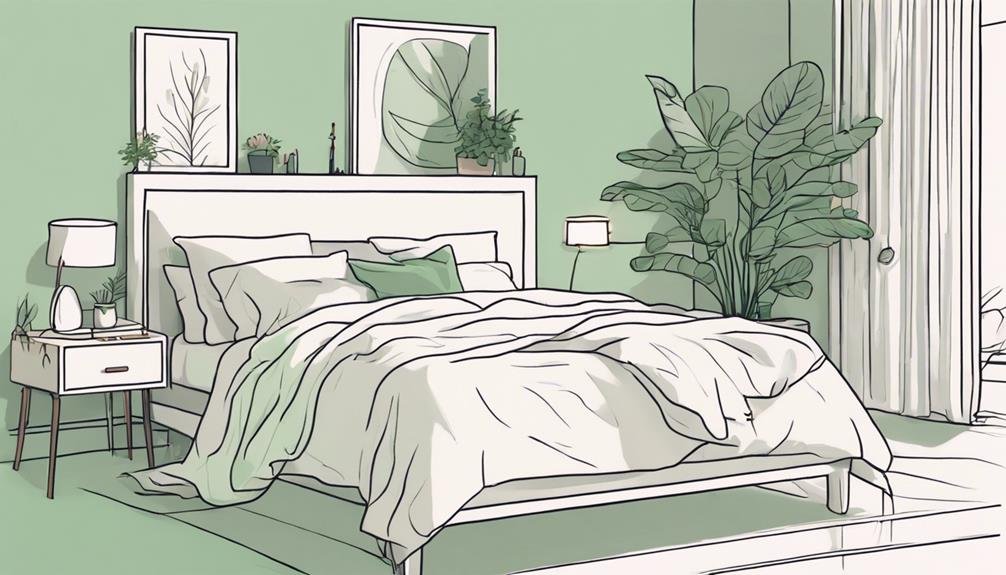10 Ways to Tune Your Body Clock After 40
Tuning your body clock after 40 is essential for boosting your energy and sleep quality. Start by understanding your circadian rhythms and setting a consistent sleep schedule; aim for 7-8 hours every night. Limit blue light exposure in the evening by turning off devices and using dim lighting. Create a calming bedtime routine with relaxation techniques. Optimize your sleep environment by keeping the room cool and dark. Incorporate physical activity regularly and manage stress through mindfulness. Pay attention to nutrition and get morning sunlight. With these strategies, you'll enhance your overall wellness and feel more rejuvenated. There's even more to explore!
Key Takeaways
- Establish a consistent sleep schedule by going to bed and waking up at the same time daily to regulate your body clock.
- Limit blue light exposure in the evening by turning off devices at least an hour before bed to enhance sleep quality.
- Incorporate regular physical activity like walking or yoga to improve sleep patterns and overall well-being after 40.
- Utilize morning sunlight exposure of 15-30 minutes to help reset your circadian rhythms and boost energy levels throughout the day.
Understand Circadian Rhythms
Understanding your circadian rhythms is essential for optimizing your sleep and daily energy levels as you age. These natural biological processes regulate your sleep-wake cycle, influencing when you feel alert or sleepy.
As you get older, your circadian rhythms may shift, causing changes in your sleep patterns. You might find yourself waking up earlier or having difficulty staying asleep.
Pay attention to how light exposure affects your body clock; natural light in the morning can help reinforce your rhythms, while artificial light at night can disrupt them.
Being aware of these changes allows you to adapt your daily activities, like when to exercise or unwind, ultimately supporting better sleep quality and enhancing your overall well-being.
Establish a Consistent Sleep Schedule
Creating a consistent sleep schedule helps regulate your body clock and improve your overall sleep quality as you age. Aim to go to bed and wake up at the same time every day, even on weekends. This routine reinforces your body's natural rhythms, making it easier to fall asleep and wake up refreshed.
You should also allow for at least 7-8 hours of sleep each night, as this duration is essential for restorative processes. If you find yourself feeling sleepy during the day, resist the urge to nap for long periods, as this can disrupt your nighttime sleep.
Limit Exposure to Blue Light

Limiting exposure to blue light, especially in the evening, can greatly enhance your sleep quality and help reset your body clock.
Blue light, emitted by screens and artificial lighting, can interfere with your melatonin production, making it harder to fall asleep.
Here are three effective ways to reduce blue light exposure:
- Use Blue Light Filters: Enable blue light blocking features on your devices or use glasses designed to filter blue light.
- Set a Screen Curfew: Aim to turn off electronic devices at least an hour before bedtime to give your body time to unwind.
- Opt for Dim Lighting: Use softer, warmer light sources in the evening to create a more conducive environment for relaxation and sleep.
Create a Relaxing Bedtime Routine
Establishing a calming bedtime routine can signal your body that it's time to wind down and prepare for restful sleep.
Start by setting a consistent bedtime, so your body knows when to expect sleep. Engage in relaxing activities like reading a book, taking a warm bath, or practicing gentle yoga.
Limit stimulating activities, and avoid screens at least an hour before bed. Consider incorporating calming scents, like lavender, to enhance relaxation.
You might also want to dedicate time for mindfulness or meditation, helping clear your mind of the day's stress.
Optimize Your Sleep Environment

A calming bedtime routine sets the stage for a sleep environment that nurtures restfulness and rejuvenation. To optimize your sleep space, focus on these essential elements:
- Temperature Control: Keep your bedroom cool, ideally between 60-67°F (15-20°C), to facilitate better sleep.
- Lighting: Use blackout curtains or eye masks to eliminate light. Dim the lights an hour before bed to signal your body it's time to wind down.
- Noise Management: Minimize disruptive sounds with earplugs or white noise machines, creating a peaceful backdrop for sleep.
Incorporate Regular Physical Activity
Incorporating regular physical activity into your daily routine can greatly enhance your sleep quality and overall well-being after 40.
Engaging in aerobic exercises, like walking, cycling, or swimming, helps regulate your body clock by promoting better sleep patterns. Aim for at least 150 minutes of moderate-intensity exercise each week.
Resistance training is equally important; it builds muscle mass, which naturally declines with age, and boosts metabolism.
Don't forget about flexibility and balance exercises, such as yoga or tai chi, which can improve your physical stability and reduce the risk of falls.
Remember, consistency is key. Find activities you enjoy, and make them a priority.
You'll notice the positive effects on your sleep and energy levels in no time.
Manage Stress Through Mindfulness

Managing stress through mindfulness can greatly improve your sleep quality and overall well-being as you age. By incorporating mindfulness practices into your daily routine, you'll find it easier to focus, relax, and unwind.
Here are three effective ways to start:
- Meditation: Set aside just ten minutes a day to meditate. Focus on your breath and let go of distractions. This can help clear your mind and reduce anxiety.
- Deep Breathing: Practice deep breathing exercises when you feel overwhelmed. Inhale deeply through your nose, hold for a moment, and exhale slowly. This activates your body's relaxation response.
- Mindful Walking: Take a walk in nature while paying attention to the sights, sounds, and smells around you. This helps ground you in the present moment and reduces stress.
Monitor Nutrition and Caffeine Intake
Balancing stress management with proper nutrition and mindful caffeine consumption can greatly enhance your sleep quality and energy levels as you age.
To support your body clock, focus on a balanced diet rich in whole foods, including fruits, vegetables, lean proteins, and healthy fats. These nutrients provide the foundation for stable energy throughout the day.
Pay attention to your caffeine intake, too. While it can boost alertness, consuming too much or drinking it late in the day can disrupt your sleep. Limit caffeine to the morning hours, and consider herbal teas in the afternoon.
Utilize Natural Light Exposure

Harnessing natural light exposure can greatly help reset your body clock and improve your overall mood and energy levels. Here are a few effective ways to incorporate more natural light into your daily routine:
- Morning Sunlight: Start your day with at least 15-30 minutes of sunlight exposure. Step outside or sit by a window to soak in those rays.
- Limit Artificial Light: Reduce your exposure to artificial lighting, especially blue light from screens, in the evening. This helps signal to your body that it's time to wind down.
- Outdoor Breaks: Make it a habit to take short outdoor breaks throughout the day. Even a quick walk during lunch can boost your mood and energy.
Utilizing natural light effectively can be a game changer for your body clock!
Consider Sleep Aids Wisely
While natural light plays a considerable role in regulating your body clock, it's important to contemplate sleep aids wisely to enhance your rest.
Over-the-counter options like melatonin can help, but they should be used cautiously. Start with the lowest effective dose, and avoid long-term reliance.
Prescription sleep medications can also be tempting, but they often come with side effects and dependency risks. Instead, consider herbal remedies like valerian root or chamomile tea, which may promote relaxation without harsh effects.
Remember, lifestyle changes—like establishing a bedtime routine and limiting screen time—can considerably improve your sleep quality too.
Prioritize these habits, and approach sleep aids as a supportive, occasional measure rather than a primary solution for better sleep.
Questions
How Does Aging Affect My Body's Natural Sleep Cycle?
Aging can disrupt your body's natural sleep cycle, making it harder to fall asleep and stay asleep. You might experience lighter sleep, more frequent awakenings, and changes in sleep patterns that can affect your overall rest.
Can Napping During the Day Disrupt My Sleep at Night?
Yes, napping during the day can disrupt your sleep at night. If you nap too long or too late, it might make it harder for you to fall asleep when bedtime comes around.
What Are the Signs of Poor Sleep Quality After 40?
Struggling with sleep signals? If you're tossing, turning, or waking frequently, you might notice daytime drowsiness, moodiness, or memory issues. These symptoms suggest your sleep quality's suffering, impacting your overall well-being and daily performance.
Are There Specific Foods That Promote Better Sleep?
Yes, certain foods can promote better sleep. Incorporate foods rich in magnesium, like almonds and spinach, along with complex carbohydrates such as oatmeal. Don't forget about turkey and chamomile tea for their calming effects, too!
How Can I Track My Sleep Patterns Effectively?
You can track your sleep patterns effectively by using a sleep diary or apps. Note your bedtime, wake time, and how you feel each morning. This visual helps identify trends and improve your overall sleep quality.
Conclusion
As the saying goes, 'A stitch in time saves nine.'
By tuning your body clock after 40, you're investing in your health and well-being.
Consistently following these strategies can help you sleep better, feel more energized, and improve your overall quality of life.
Remember, it's never too late to make positive changes.
Embrace these tips, and you'll find that a well-adjusted body clock can lead to brighter days ahead.







